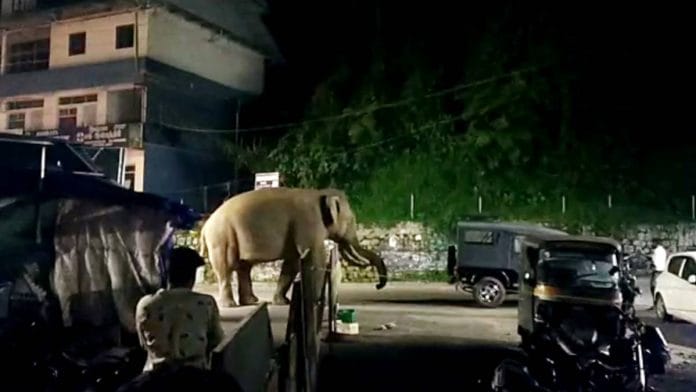Thiruvananthapuram: Kerala’s Left Democratic Front (LDF) government has introduced legislation in the Assembly to amend The Wild Life (Protection) Act, 1972 citing instances of the human-animal conflict in the state’s hill areas, and multiple failed attempts to convince the central government to amend the Act.
At an assembly session Thursday, the Wildlife Protection (Kerala Amendment) Bill, 2025, was introduced. It is the first time that an Indian state has introduced such a bill.
With 54 percent forest cover, Kerala currently sees human-wildlife conflict as one of its major concerns. With the Opposition in the state supporting the intent behind the newly introduced legislation, a subject committee will now consider the same.
According to forest department data, 17 lives have so far been lost this year in man-animal conflict in Kerala. Earlier, 67 deaths were logged in 2024, 94 in 2023, 98 in the preceding year, and 114 in 2021.
Of the 394 deaths in human-animal conflict since 2011, wild elephants killed 285 persons, and wild boars and tigers, among other animals, killed the rest. Since 2020, the state government has spent Rs 2,644.17 lakh towards compensation for the victims.
Also Read:A home for Priyanka: Congress MP looks to build connect at grassroot level in Wayanad
Provisions of the bill
One of the provisions of the bill allows the chief wildlife warden to tranquilise, translocate, or kill a wild animal if it attacks a person, causes severe injuries to a person outside the forests, or enters the residential areas.
Another provision empowers the warden to implement birth control measures or translocate animals of a wild species when their population becomes too high and poses a danger, even when it is a species protected under Schedule II of the 1972 Wildlife Protection Act.
The bill also states that the Kerala government can declare an animal in Schedule II as ‘vermin’, which does not get any protection under the 1972 Act, for up to six months in specific areas based on studies and expert reports.
Moreover, the bill moves the species bonnet macaque, also known as zati or bonnet monkey, from the Schedule I category—the highest protection level—to Schedule II. The move will allow higher state-level discretion in dealing with the animal.
Apart from the newly introduced bill, the state’s forest department has been working on a comprehensive policy to tackle human-animal conflict through landscape-specific crisis mitigation plans.
Centre-state tensions
The Centre earlier rejected two of the state government’s proposals to amend the Wildlife Protection Act to declare wild boar as ‘vermin’ and move the bonnet macaque from Schedule I to Schedule II.
The new bill notes that the existing Wild Life (Protection) Act was passed by Parliament when many species of wild animals and birds were facing rapid extinction or decline.
There was also no restriction on hunting at the time, and the state laws were inadequate to deal with hunting, the bill highlights.
A long time has passed, the new bill says, since the Act came into force. The numbers of wild animal and bird species in the state have since then increased, it adds, pointing out continuous human-animal conflict in recent times, as well as deaths and damage to crops.
The bill notes that the 1976 Constitutional Amendment placed ‘forests’ and ‘protection of wild animals and birds’ in the Concurrent List, giving the state legislatures the power to enact laws on the subjects concerned.
However, the timing and chances of success of the bill have raised some eyebrows.
According to the Kerala Independent Farmers Association (KIFA), which has been studying the state’s wild animal population as well as human-animal conflict mitigation measures, the bill can only materialise if the President gives her assent, as The Wild Life (Protection) Act, 1972 is a central law, passed by Parliament.
“To present an amendment to a central law in the Assembly—when legally not possible—is nothing but making a fool of itself through political theatre, which is what the LDF government in Kerala is doing,” a KIFA statement said.
‘Politicised issue’
Introducing the bill in the Assembly, Kerala Forest Minister A.K. Saseendran claimed the continuous neglect of demands for amendments to the original Act forced the state government’s hand. “The state, through a resolution and through letters, had requested the central government to amend the 1972 Wildlife Protection Act. I, along with Revenue Minister Rajan, went to Delhi, in person, to request the same before the Lok Sabha polls. But we experienced a dismissive attitude from the Centre,” the minister said.
He said that the LDF government wants to go ahead with the amendments because ‘forests’ and ‘protection of wild animals and birds’ are Concurrent List subjects, and also, the public and the opposition parties have supported the amendments. “We might have to send it to the President, and there are no other legal hurdles,” he added.
The minister stated that the Centre was behind the politicisation of the issue, with many central ministers, while visiting Kerala, claiming that the subjects fell under the purview of the LDF government, but maintaining a completely different stance when the LDF ministers officially approached them.
On Thursday, the minister also introduced the Kerala Forest (Amendment) Bill, 2025, to ease restrictions on using sandalwood from private land and allow the compounding of certain forest offences, even after prosecution work has started.
Congress MLA A.P. Anil Kumar said the Opposition welcomes the amendment as locals in the hill areas of Kerala are facing difficulties due to the incidents of man-animal conflict, but also pointed out that the LDF government is coming up with the bill only months before the assembly and local body polls.
“We need assent from the Governor and President. By that time, a new government would be in power. The issue is not new. We have raised the issue through different means 10 times. Why did it take so long for the government?” Anil Kumar asked.
(Edited by Madhurita Goswami)






